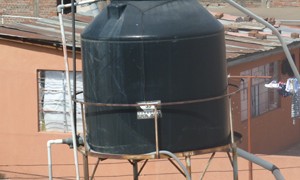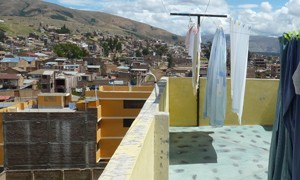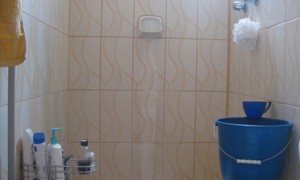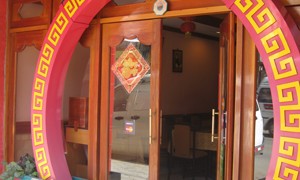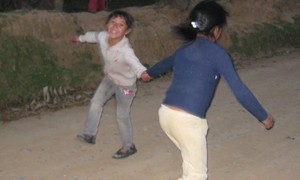The other day, my parents (who live in Vancouver) received a letter from the government that was an ideal example of the differences between living in Peru and Canada. Here’s how the letter went:



Living in Peru, especially in Huancayo, has always conjured up images of a simple life for me. The year I first moved to Huancayo, simplicity was what I had come to value and what I continue to define myself by. It is my effort to not be carried away by materialism and the associated negativity.
“I can live in an adobe house with dirt floors without electricity and get mite infections every few months, but I cannot live without hot showers,” I remember saying back in the day.
The Chinese have been living in Peru since they arrived on ships that traveled across the Pacific in the 1850s. They were the first Asians to make it to South America and came as coolies who worked in guano mines and sugar plantations.
San Pedro de Saño is a relatively rural town around half an hour outside of Huancayo. One of its poorest neighborhoods is filled with immigrants from Huancavelica, the poorest province in Peru. There, everyone knows each other, many are intricately related to each other, and children play freely in the streets.
Our toilet usually makes an annoying, sporadic dripping or trickling sound. There have also been a few times, before the rooster on the fourth floor wakes up to crow, that the toilet will make an explosive racket, gurgling and spitting up convulsively. The first time we woke up to the auditory chaos, we thought the washroom had flooded. It turns out, this happens when the enormous water tank on the roof is suddenly switched on after being empty for hours. As it fills, the extremely high water pressure quite literally shoots water down to all the apartments below.
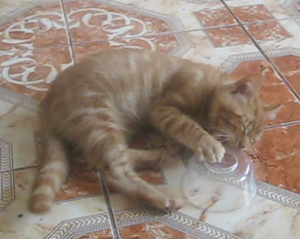
Today, the toilet was quiet and the landlady knocked on our door at eight in the morning to advise us to collect as much water as we could. I was prepared. These days, I fill any available empty bottles with water. We can at least use this water to flush the toilet. The most valuable water is the pitcher of boiled, potable water we keep in our fridge. This gets rationed out to ourselves and to Fénix the kitty because we’re never sure how long the water famine will last.
Desperate times call for ingenuity and resourcefulness. We were ecstatic when we thought of bringing down rain water that had collected in buckets near the laundry station on the roof. It was a good thing we woke up early because the early bird catches the worm and wins the precious water. This morning, I had the clever idea of trying to empty any existing water that might have collected in our shower tank. Unfortunately, there were only 10 drops.
But we value what we have.
Have you ever experienced not having a key resource when you needed it? How did you approach the situation?
Huancayo is surrounded by farmland, so I’ve encountered a myriad of animals ranging from livestock for livelihood to city pets in silly clothes. Some animals have a purpose: cows for fresh milk, donkeys for reliable transport and alpaca for soft wool. There are also animals raised solely for food: chickens and pigs. Other animals are clearly pets: dogs, cats, hamsters and iguanas. I’m still getting used to the fact that guinea pigs are always raised for food, often cooked as a special dish, and never kept as companions.
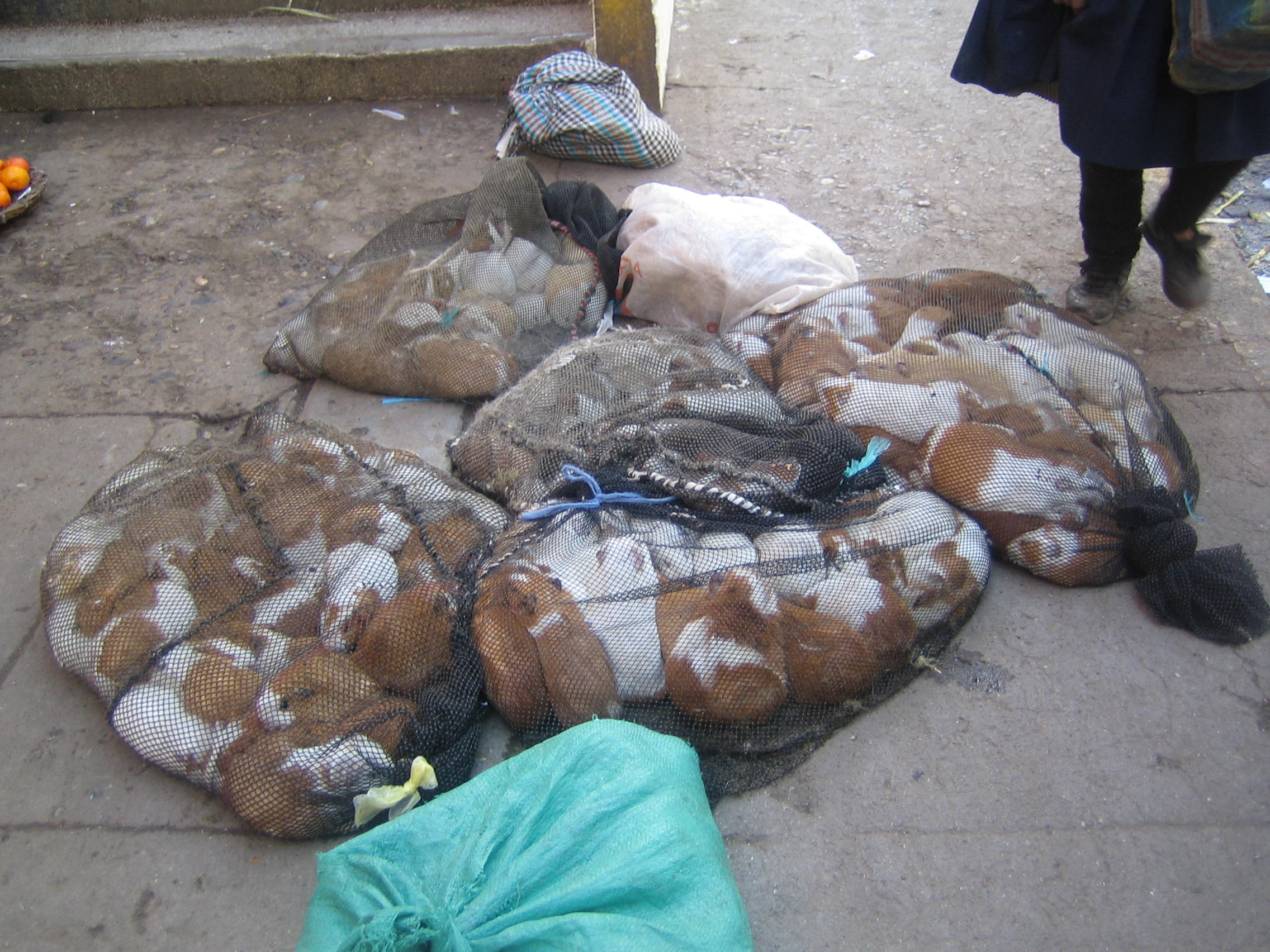
Since neutering is expensive and uncommon, Huancainos are more likely to receive a puppy from a friend or pick up a stray kitty. Some homeowners have come-as-they-go pets who show up during the day to have a snack, hang out for a while and then leave every evening. Stray dogs are rampant here. They often walk right beside you and sleep in the middle of the sidewalk as if they own the city. You’re part of their daily drama when it comes to scavenging, playing, fighting and copulation. In the more rural areas, stray dogs can be vicious, so you always carry a rock around and hopefully, never have to actually throw it.
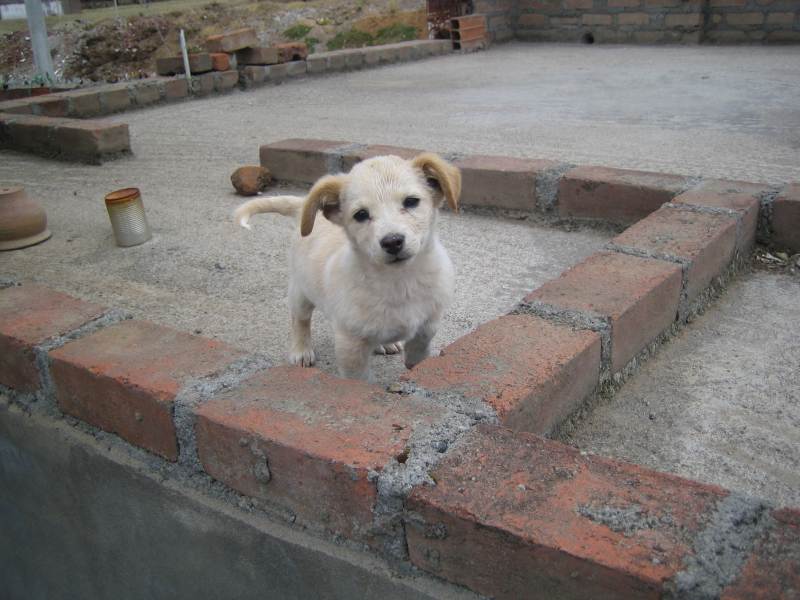
To communicate with Peruvian animals and animal owners alike, the foreigner must learn new vocabulary of onomatopoeic words. Cats are almost always called “Michi,” often in place of an actual pet name. This name apparently derives from the sound they make: “miau” (“meow”). Dogs are usually pinned “Fido” (“fee-doh”) and they say “guau” (“wow”). I still don’t understand how chicks “pio pio,” although it probably makes more sense that I wake up to the rooster on the fourth floor greeting me with “ki ki ri ki” rather than “cock-a-doodle-doo.” The only other animals that seem to express themselves similarly to their North American counterparts are pigs (“oink”), ducks (“cuac”) and cows (“muu”).
We welcomed a kitty to the family last Thursday and were surprised to learn that he speaks both cat and dog languages, miau-ing and guau-ing in his conversations with us. After a day of fear and loathing for getting him vaccinated, Fénix (Spanish for “Phoenix”) is now purring like a motor, playing with all reachable shoelaces and falling into unescapable buckets:
The more I take combis (Peruvian public transportation) in Huancayo, the more I envision the combi as a microcosm of Peruvian life.
Resourcefulness
Today I rode a combi that had a little speaker hanging dangerously over the heads of some passengers. It was tied onto an inner metal support bar and wired to the front of the van somehow so that people in the back could enjoy the same Peruvian cumbia music as the driver. It wasn’t even working, but it’s the thought that counts.
Last week, when I hopped onto a combi to escape the pouring rain, there was a leak near the window and rain was dripping onto one of the seats. They stuffed a cloth into the crack to stop the leak. It would be temporary. The combi worked fine when it wasn’t raining. They were never going to fix that window.
To me, these are examples of resourcefulness and of taking advantage of what’s available. They’re examples of being okay with imperfection. The lesson is to care less about the little details and more about making something functional. It’s about using something for its full worth and then finding ways to extract even more out of it, instead of continually buying the latest gear or replacing the whole package because of a tiny tear.
Tolerance
I have been on various interrupted combi rides. Sometimes the combis take a different route because there’s a parade or party going on downtown. Sometimes they take shortcuts without warning their passengers or explaining why. Sometimes the police will stop the combi for going too fast or taking passengers in undesignated areas, and everyone on the combi has to wait.
It’s impossible to know what to expect and things aren’t always fair, but they happen so you live with them. People learn to let things go. Maybe sometimes toleration is expressed as repression or resignation, but what’s important is knowing when to choose their fights. Toleration can also be seen as a type of acceptance. In the grand scheme of things, life isn’t ever fair and this realization melts indignation and demands respect.
Community
At any given time, you may ride a combi in the company of dogs, chickens, piglets, or even sheep. The owners often hop on with large mantas (a large cloth ladies use to carry load on their back), filled with what they’ve bought at the market as if their mantas were large purses and shopping bags combined into one.
There are unspoken rules to help each other out. The cobrador (money collector) always helps the ladies with their things, especially if they have extra boxes. The passengers get up to give the ladies their seats. Not only do these ladies get priority seating, but I’ve also seen people get up for seniors and pregnant women just like in Canada.
Sometimes, a child or recovering drug addict gets on the combi to sing or tell their life story, and then ask for our “collaboration” with whatever we can spare. You see the nod of the cobrador: “Come on in. I know what it’s like to live a hard life too.” And after the presentation, the passengers on the combi share — at least half of them.
There’s poverty here, but it hasn’t become cut-throat, at least not in the Andes. There’s still a sense of community. It’s near impossible to live an isolated lifestyle. Huancainos know that no man is an island and being packed into a combi together is only a physical affirmation of the links between you and your neighbours.
My professor from Canada came to visit for a whirlwind week and packed in…
- A 2-day conference on infant stimulation that we’ve been planning for months,
- A full day of hardcore bulk shopping in the Sunday fair that spans more than 30 city blocks of the main street through Huancayo (mostly jewellery for her and millions of other trinkets that her son can sell back home),
- And the rest of the week was spent conducting full days of research with babies and toddlers in San Pedro de Saño (a little town just outside of the big city).
Part of her assignment here was to conduct mid-internship Coady interviews individually with Maria and me. The question that had me thinking went something like this: “What skills have you learned from your internship that will benefit you in your future work?” Skills, skills, skills. The first skills that came to mind when I thought of what I’ve learned here in Huancayo had nothing to do with my internship. I thought of how I could now fill the kettle without it spilling in pitch darkness, notice the slight difference in sound when the water had started boiling, and how my internal clock knew when the 10 minutes of boiling time was up (to be sure the water was purified) because I do this every morning to make my coca tea. I thought of how I skilled I was at doing laundry by hand (well, sorta). I thought of how I learned to keep an apartment clean (because Maria made me, just kidding – sorta; she was the positive influence, that’s what I meant). And I’d like to say that I can now cook, but just the other day, I suggested we add mango pieces to our pasta dish and Maria said that it would never work. =P It is a skill that will take a much longer time for me to learn, I’m afraid.
In any case, I had to think twice to respond to the actual question. What skills had I learned? Not just any skill, but something that will benefit me in my future field? I’ve learned a heck of a lot about international development – which I didn’t even know existed prior to arriving in Nova Scotia for training – but to be honest, I’m not so sure I’ll be involved in this field in the future. It had to be something more abstract.
Then, it came to me. “Flexibility and patience,” I answered. It is a skill to be able to get along with people from other cultures, whether it’s the Dutch (there is the couple who started the NGO and the other two volunteers from the Netherlands) or the wide variety of Peruvians here (of different ages, ethnic backgrounds, and lifestyles). It’s about learning to accept differences, personal boundaries, and idiosyncrasies, taking everything in with an open attitude instead of succumbing to the natural temptation to judge. For me personally, it was also what I needed in order to learn the language – flexibility in the choice of words (because not every phrase can be translated literally) and patience with myself as I made a million mistakes.
As I thought of that, I realized that another skill I had developed (that I had wanted to develop) was the ability to laugh at myself. Recently, we (the interns in all the different corners of the world) were sent the letters we had written to ourselves at the beginning of everything, in July when we were still in Nova Scotia. I had written, “I hope you learn to laugh at yourself.” I think I had to lose the fear of embarrassing myself especially when you’re learning to speak a foreign language because it’s bound to happen that you’ll be telling someone, “Can I feel myself here?” (sentirme) instead of “Can I sit here?” (sentarme).
It seems to me that a fundamental issue many have once they start working full-time is that they stress out, take things personally, take things too seriously, and start thinking only about themselves and their dissatisfaction. This is when these skills will come into play in my future work: flexibility (letting things be as they are instead of always fitting things into a certain schedule or plan), patience (with myself as I know that I will inevitably make mistakes and I will be the most conscious of this if I ever find myself in a more senior position, with higher expectations of myself and more susceptible to being intolerant of my blunders), and the ability to laugh at myself (to keep relaxed in this way, living life light-heartedly so that I have a balanced relationship with myself, my co-workers, my family, and my friends).
You will not believe where I am and what I am currently doing. I am sitting in what I like to call my dream suite. I am on the sixth floor of what used to be a glamorous hotel, now converted into a less glamorous hostel yet still classic and filled with character. I am in the middle of downtown Santiago, Chile. But it seems like Europe and now I have a real taste of the way Europe has been described to me. The city as I’ve experienced it so far is incessantly busy, filled with pedestrians, lights, and action.
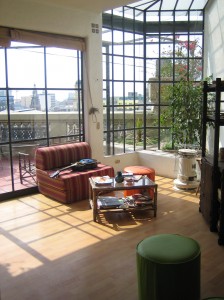
Oh, the chilenos… I have never seen so many different kinds of unique faces and of those, so many that have so much character, that spike the curiosity, that can tell a story with a single expression. If i had to base it on the people I’ve been observing – on these first impressions – I wouldn’t be able to describe to you a typical chileno. I can’t even begin to.
But really, I could and would prefer to stay here in my hostel for the rest of the long weekend and beyond. It’s like a honeymoon deluxe, beautifully decorated, lots of glass = lots of light, plants/greens for freshness, high ceilings, antique furniture, classic books on the shelf, a fully-functioning yet quaint kitchen. A lady comes in to lay out a buffet on the dining table every morning for breakfast just for the three of us (Mike, Maria, and I). When we arrived, there was toast, a variety of marmelades, various flavours of tea for every mood imaginable, eggs, fruits, milk.
Then there’s the private balcony that has the most amazing view of downtown Santiago – far enough up on the sixth floor to get the big picture, but close enough to the earth to be able to distinguish inidviduals chatting, kissing, hugging, waving, being. I could stand there on the balcony all day and just daydream. In fact, I could just be here in this hostel all day, curled up by one of the electric heaters and reading a classic. Or dragging an electric heater over to the computer and writing blog entries. Or taking a long, relaxing, and more importantly hot shower (the first time in months), staring up at the sky through the glass opening above.
I am so glad that I decided to travel.
- 1
- 2
Copyright © 2024 Samantha Bangayan | Sitemap | Disclosure Policy | Comment & Privacy Policy
All articles and photos in this blog are licensed under the Creative Commons Attribution License CC BY-NC-ND 3.0.
